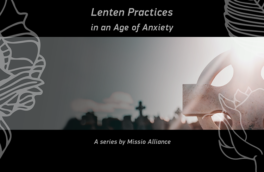The period from sundown on Holy Thursday to sundown on Easter Sunday, known as the Paschal Triduum, contains the most important days of the church calendar.
Christians make a liturgical passage through three distinct yet interanimating stages, progressing through Jesus’ suffering and crucifixion to his entombment and eventual resurrection three days later.
Christian tradition holds that while Jesus’ body lay in the tomb, his soul descended into hell, or the realm of the dead, as stated in the Apostle’s Creed. But this second day of the Paschal Triduum is largely overlooked by Christians. Holy Saturday, the theological nexus between death and resurrection, is usually collapsed into a seemingly inconsequential, stagnant space between the agony of Golgotha and the glory of the empty garden tomb.
The Space Between Death and Resurrection
The day after Jesus was crucified, his lifeless body laid in a tomb. The disciples, along with Mary, the mother of Jesus, were bewildered, shaken by grief over the loss of their beloved teacher, her beloved son. That Saturday was engulfed by the impossibility of imagining life regained. There was no guarantee that breath would again animate his limp, cool body. The future could not be foretold. There were no signs of life. Mary and the disciples were without answers.
Resurrection is not a hurried movement to overcome suffering, loss, or tragedy, though it can feel like it is, largely due to the church’s embeddedness in American cultural values of quick victories and triumphalism. Resurrection is not a hurried movement to overcome suffering, loss, or tragedy, though it can feel like it is, largely due to the church’s embeddedness in American cultural values of quick victories and triumphalism. Click To Tweet
The words of theologian Shelly Rambo help us gain an appreciation for the rich theological meaning Holy Saturday holds. In Spirit and Trauma: A Theology of Remaining, she writes:
The narrative of triumphant resurrection can often operate in such a way as to promise a radically new beginning to those who have experienced a devastating event. A linear reading of cross and resurrection places death and life in a continuum; death is behind and life is ahead; life emerges victoriously from death. This way of reading can, at its best, provide a sense of hope and promise for the future. But it can also gloss over the realities of pain and loss, glorify suffering, and justify violence.
Far from being insignificant, Holy Saturday couldn’t be more relevant for Christians, especially during this period of a global pandemic. Jesus-followers don’t need to rush toward the glory of new life when that is not where we are. COVID-19 has brought us collectively into a Holy Saturday space, a threshold that can become a theological container for our deep uncertainties, incomprehensible losses, and profound anxiety about the future.
Will things ever go back to normal? Will COVID-19 ever be contained? Will the jobs lost ever be replaced? Will political powers sacrifice the elderly for the sake of jump-starting the economy?
Like Mary and the disciples following Jesus’ death, we are inhabiting a period characterized by waiting, a liminality marked by an inability to see the future clearly. We don’t know when the pandemic will be under control. We don’t know when a vaccine will be released. We don’t know how many will die, or if our loved ones will be infected, or if we’ll inadvertently transmit it to someone else, or if the economy will recover.
Waiting in the Tension of Hope and Lament
We are living between the pre-pandemic world that was and a post-pandemic world that is to come. This is a tenuous, transitionary period in which old is no longer and the new is not yet here.
In this time of Holy Saturday, we come face-to-face with a pervasive ambiguity and questions that do not yet have answers. Like Mary and the disciples, we are experiencing a time of profound bewilderment about what tomorrow, next month, next year may hold for us and our families, our neighborhoods, our nation, and our world. We sit with our grief, sorrow, and fear. The silent waiting of Saturday invites us to witness to the suffering that exists inside of us and around us and to be present with it all, void of easy solutions, absent of miracle fixes.
But what about hope? you may rightfully ask. Indeed, we must cling to it like a lifeline while simultaneously listening for Saturday’s invitation into something equally important: to wrestle with unanswerable questions, to lament honestly over our losses, and to mindfully attune to the confusion and disorientation that we’ve found ourselves in. We can—indeed, we must—allow this time to tend to the grief and anxiety in ourselves and in our faith communities and to be present with what is. Christian hope doesn’t nullify a radical acceptance of pain. Christian hope doesn’t nullify a radical acceptance of pain. Click To Tweet
There will be a time when we will gather together in our churches again and the crescendos of praise will drown out all remnants of lament. The goodness and glory will be inescapable.
Easter Sunday will come.
But for right now, we are living through Holy Saturday, and with Mary and the disciples, we wait for signs of life.









Missio Alliance Comment Policy
The Missio Alliance Writing Collectives exist as a ministry of writing to resource theological practitioners for mission. From our Leading Voices to our regular Writing Team and those invited to publish with us as Community Voices, we are creating a space for thoughtful engagement of critical issues and questions facing the North American Church in God’s mission. This sort of thoughtful engagement is something that we seek to engender not only in our publishing, but in conversations that unfold as a result in the comment section of our articles.
Unfortunately, because of the relational distance introduced by online communication, “thoughtful engagement” and “comment sections” seldom go hand in hand. At the same time, censorship of comments by those who disagree with points made by authors, whose anger or limited perspective taints their words, or who simply feel the need to express their own opinion on a topic without any meaningful engagement with the article or comment in question can mask an important window into the true state of Christian discourse. As such, Missio Alliance sets forth the following suggestions for those who wish to engage in conversation around our writing:
1. Seek to understand the author’s intent.
If you disagree with something the an author said, consider framing your response as, “I hear you as saying _________. Am I understanding you correctly? If so, here’s why I disagree. _____________.
2. Seek to make your own voice heard.
We deeply desire and value the voice and perspective of our readers. However you may react to an article we publish or a fellow commenter, we encourage you to set forth that reaction is the most constructive way possible. Use your voice and perspective to move conversation forward rather than shut it down.
3. Share your story.
One of our favorite tenants is that “an enemy is someone whose story we haven’t heard.” Very often disagreements and rants are the result of people talking past rather than to one another. Everyone’s perspective is intimately bound up with their own stories – their contexts and experiences. We encourage you to couch your comments in whatever aspect of your own story might help others understand where you are coming from.
In view of those suggestions for shaping conversation on our site and in an effort to curate a hospitable space of open conversation, Missio Alliance may delete comments and/or ban users who show no regard for constructive engagement, especially those whose comments are easily construed as trolling, threatening, or abusive.